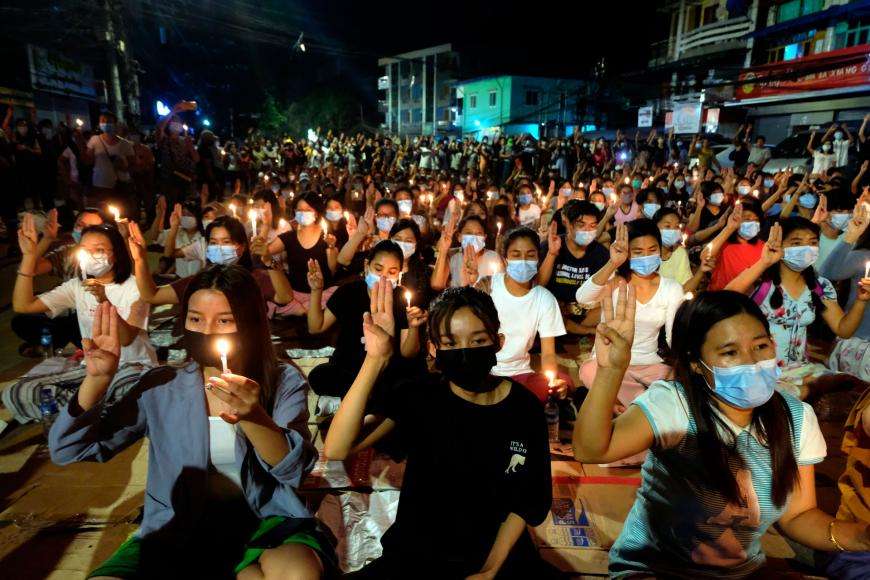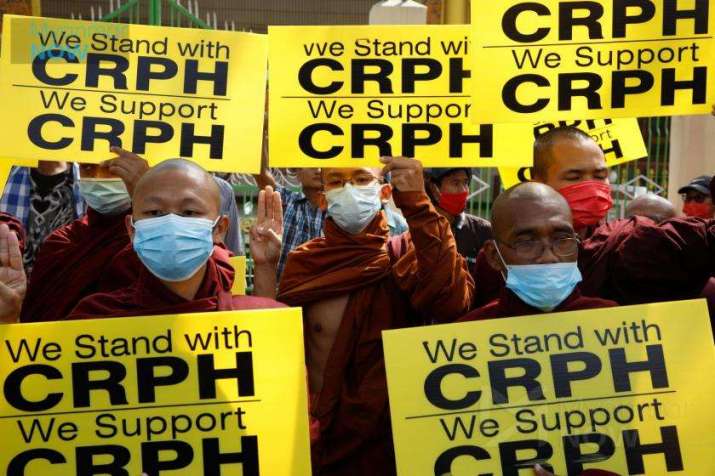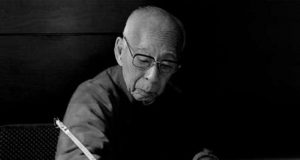
The most senior Buddhist monks in Myanmar have called on the country’s military to halt its increasingly violent crackdown on civilian pro-democracy demonstrators protesting last month’s coup. The State Sangha Maha Nayaka Committee (Ma Ha Na), a government-appointed body that oversees Myanmar’s Buddhist monastic community, has drafted a statement decrying an “armed minority” for killing and torturing innocent civilians.
In a series of social media posts today, the Myanmar Now news agency reported that the Ma Ha Na had issued a draft five-point statement that called on the military junta to end “the violent arrest, torture, and killing of unarmed civilians by the armed minority and to prevent the looting and destruction of public property.” (Myanmar Now Twitter)
According to the independent Assistance Association for Political Prisoners, since the coup began last month, at least 202 people have been killed as of 16 March.
The State Sahgha Maha Nayaka Committee (Mahana), a government-appointed body that oversees Myanmar’s Buddhist monkhood, has decided to stop its activities following a meeting today, one of the 47 monks who was in attendance told Myanmar Now. (THREAD) #WhatsHappeningInMyanmar pic.twitter.com/nN9ycziyGe
— Myanmar Now (@Myanmar_Now_Eng) March 16, 2021
“It is similar to the CDM,” a Ma Ha Na committee member said in reference to the ongoing Civil Disobedience Movement. “After the decision is submitted to the religious affairs minister, the statement may change. I want you to know what the original says, because it may be changed. This is the decision of the 47 abbots.” (Myanmar Now)
Buddhist monastics, venerated throughout Burmese society, are highly influential in Myanmar (formerly Burma), a predominantly Theravada Buddhist country in which 88 per cent of the population of roughly 60 million people identify as Buddhists, according to census data for 2014. Buddhist monastics stood at the forefront of pro-democracy protests against the previous military junta in 2007, a movement known as the Saffron Revolution, which helped to bolster grassroots support. Buddhist monks in this Southeast Asian nation are estimated to number in excess of 500,000, mainly centered in and around the cities of Yangon and Mandalay, with some 75,000 Buddhist nuns.
The UN human rights office (OHCHR) stated yesterday that it is “deeply disturbed” that the violence by security forces targeting peaceful protesters “continues to intensify,” with a soaring death toll on the streets, increasingly aggressive use of lethal force, arbitrary arrests, and reports of torture in custody. (UN News)
The victims of the Myanmar junta's shooting sprees did nothing more than to want democracy for their country, not another brutal military dictatorship. https://t.co/lhUSs1eTZm pic.twitter.com/RIJLSs8Y2A
— Kenneth Roth (@KenRoth) March 17, 2021
At least 11 people were killed on Monday in addition to at least 57 deaths over the weekend, marking the bloodiest days since protests started last month, UN News reported.
“There are many more reports of further killings that we have not been able to corroborate yet,” said OHCHR spokesperson Ravina Shamdasani, adding that confirming information was “becoming increasingly difficult” because of martial law and communications blackouts imposed in several areas where people have been killed and displaced. (UN News)
“We are deeply disturbed that the crackdown continues to intensify, and we again call on the military to stop killing and detaining protestors,” Shamdasani urged. (UN News)
Myanmar’s military declared a year-long state of emergency on 1 February, after detaining President Win Myint, State Counselor Aung San Suu Kyi, and other senior members of the governing National League for Democracy (NLD) party. The coup d’état took place just hours before the country’s new parliament was due to convene following a general election in November last year, during which the NLD made substantial electoral gains.
A protester-free demonstration against military dictatorship is seen near the Aung Zeya Bridge in #Yangon’s Insein Township on Wednesday. Following a series of crackdowns by the junta's security forces, a number of such ‘protests without protesters’ have sprung up across #Myanmar pic.twitter.com/PvvUT2aTnu
— The Irrawaddy (Eng) (@IrrawaddyNews) March 17, 2021
Suu Kyi, who served the country from 2016–21 following a long struggle for democracy that overturned decades of military rule, remains under house arrest and is facing a growing litany of charges from the coup leaders in an apparent attempt to provide a legal veneer for her detention. Before leading the civilian government, Suu Kyi, now 75, spent almost 15 years under house arrest for her efforts to bring democracy to Myanmar.
The military, which had backed the parliamentary opposition in the national election, has asserted that it staged the coup in response to electoral fraud, however the national election commission has said there is no evidence to support these claims. The NLD won around 80 per cent of the available parliamentary seats in last year’s vote.
Since seizing power, the self-styled State Administration Council (SAC), led by military commander-in-chief General Min Aung Hlaing, has unilaterally amended the country’s treason and sedition legislation in an apparent bid to secure impunity for the coup leaders.

A nationwide civil disobedience movement (CDM) has quickly gathered pace in the wake of the coup, with hundreds of thousands of people protesting in towns and cities across the country, denouncing the military and calling for the release of detained civilian leaders. The CDM movement, which began with medical personnel, has since been taken up by teachers, engineers, railway workers, bank staff, and even some members of the police force, who have switched sides to join the protestors.
“As of 16 March, a total of 2,181 people have been arrested, charged, or sentenced in relation to the attempted military coup on 1 February,” the Assistance Association for Political Prisoners reported in a daily update. “Of them, 13 were convicted; two to two years imprisonment, one to three months, two to one year imprisonment, eight to three months imprisonment. Seventy-three have been charged with a warrant and are evading arrest, 319 were released. A total of 1,862 are still under detention or have outstanding charges/evading arrest, including the 13 sentenced. . . . Detainees have not been allowed to meet with their relatives and legal representatives, no one knows where so many have been detained.” (Assistance Association for Political Prisoners)
See more
High-ranking Buddhist abbots move to suspend activities, echoing Civil Disobedience Movement (Myanmar Now)
Daily Briefing in Relation to the Military Coup (Assistance Association for Political Prisoners)
Myanmar: UN rights office ‘deeply disturbed’ over intensifying violence against protesters (UN News)












